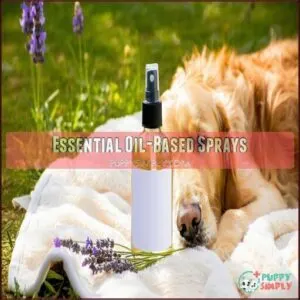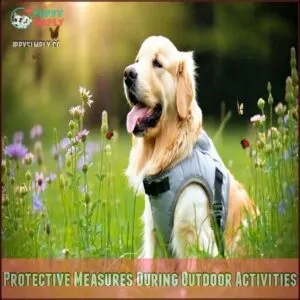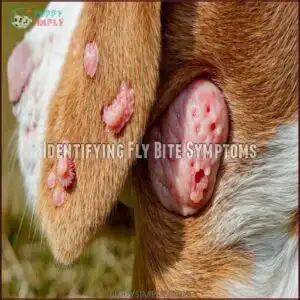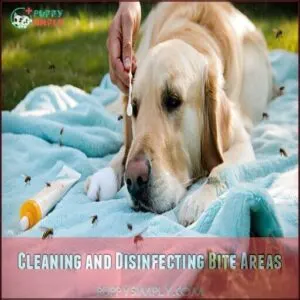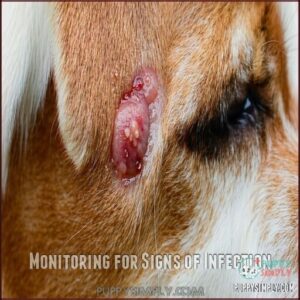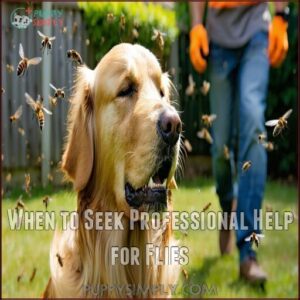This site is supported by our readers. We may earn a commission, at no cost to you, if you purchase through links.
 To keep flies off your dog, focus on cleanliness and prevention.
To keep flies off your dog, focus on cleanliness and prevention.
Bathe your dog regularly using a pet-safe shampoo, and keep their fur groomed and free of mats.
Clean up yard waste and dog messes quickly since flies love these spots.
Applying dog-safe natural repellents like a mix of water and apple cider vinegar can help, too.
Try adding fly-repelling plants like lavender or basil near your dog’s hangout areas.
Check for wounds or irritated skin because flies tend to target those.
A little effort goes a long way in making your pup unappealing to those buzzing pests—your dog will thank you for the prevention!
Table Of Contents
- Key Takeaways
- Why Flies Are Attracted to Dogs
- Types of Flies That Bother Dogs
- Keeping Your Dog Clean to Repel Flies
- Natural Fly Repellents Safe for Dogs
- Creating a Fly-Free Environment for Dogs
- Protective Measures During Outdoor Activities
- Treating and Preventing Fly Bites on Dogs
- Fly Control in Your Home and Yard
- When to Seek Professional Help for Flies
- Frequently Asked Questions (FAQs)
- How do you keep a dog from biting flies?
- How do I get rid of flies on my Dog?
- How do I stop flies from bothering my dog?
- How to keep flies away from a dog?
- Can dogs use essential oils to repel flies?
- How to get rid of flies in a Dog’s Garden?
- How do I keep flies off my dog naturally?
- What repels flies but safe for dogs?
- Do certain dog breeds attract more flies?
- Can dietary changes reduce fly attraction?
- Conclusion
Key Takeaways
- Keep your dog clean and groomed by bathing them regularly and brushing their coat to remove debris, odors, and flies’ favorite hiding spots.
- Use safe, natural repellents like diluted apple cider vinegar or essential oils (lavender or citronella) to deter flies from your dog’s ears, coat, and skin.
- Remove attractants like poop, leftover food, and standing water from your yard to prevent flies from breeding and buzzing around your pup.
- Watch for fly bites, skin irritations, or health issues, and treat them quickly using vet-approved sprays or by consulting your vet if problems persist.
Why Flies Are Attracted to Dogs
You’ll find flies buzzing around your dog because they’re attracted to odors from unclean fur, feces, open wounds, and the natural oils on your pet’s skin.
Flies buzz to unclean fur, odors, and open wounds like magnets, making regular grooming and hygiene a must for your dog.
These pests particularly target dogs with matted coats, skin conditions, or illness, as these conditions provide ideal environments for flies to feed and lay their eggs, making them especially vulnerable to skin conditions.
Odors From Dirty Fur and Feces
The humble housefly has a bizarre attraction to your dog’s odors.
These pesky insects zero in on unwashed fur and feces like little airborne detectives. Dog waste management is essential since flies use dirty fur as dining tables and breeding grounds.
Regular grooming frequency (twice weekly) drastically reduces their interest, while prompt fecal management eliminates their favorite landing spots.
Your pup’s diet impact matters too – certain foods can intensify body odors, making your dog even more appealing to these unwanted visitors, due to the dog’s odors and feces.
Open Wounds and Skin Conditions
Your dog’s open wounds and skin conditions act like a dinner bell for flies.
Open wounds and untreated skin issues are like ringing a dinner bell that flies simply can’t resist.
These unwelcome insects find your pup’s health issues irresistible, increasing infection risks and potentially causing serious complications.
Why flies target your dog’s wounds:
- Blood and discharge emit attractive scents flies can detect from surprising distances
- Raw tissue provides an easy feeding site for female flies looking to lay eggs
- Inflammation and moisture create the perfect environment for fly activity
Prompt wound protection and veterinary care prevent fly bites on dogs, especially when you notice flies eating your dog’s ears or other vulnerable areas.
Sweat and Body Oils
Three key factors make your dog’s sweat and body oils irresistible to flies.
When temperatures rise, your pup’s natural odor production intensifies, creating a buffet for buzzing pests.
| Fly Attraction Factor | Reason | Prevention |
|---|---|---|
| Skin Microbes | Create unique odors | Regular bathing |
| Natural Body Oils | Trap dirt particles | Weekly brushing |
| Breed Differences | Some dogs produce more oils | Breed-specific hygiene |
Different breeds have varying oil production, with some naturally attracting more flies.
Maintaining your dog’s natural balance through proper hygiene impact helps repel these unwanted visitors, and understanding fly attraction factors is crucial for effective prevention, including regular bathing and breed-specific hygiene to reduce body oils.
Matted or Unclean Coats
Flies find paradise in matted or unclean coats, which provide perfect fly breeding grounds. Your dog’s tangled fur traps food particles, dead skin cells, and natural oils that flies can’t resist.
- Regular brushing prevents matting and removes debris that attracts flies
- Weekly baths with dog-specific shampoo eliminate odors flies love
- Professional grooming every 6-8 weeks helps maintain coat health
Different breeds have different coat care needs. Long-haired dogs require more frequent brushing for effective fly prevention, while short-haired breeds benefit from weekly DIY grooming sessions to maintain their coat health and prevent matting, which is a key factor in fly prevention.
Illness and Diarrhea
A sick pup attracts flies like a magnet. When your dog suffers from underlying illnesses or digestive issues, the odors and moisture from diarrhea create perfect conditions for flies.
This isn’t just annoying—it increases disease transmission risks from harmful microorganisms. Proper hygiene challenges must be addressed immediately by cleaning affected areas and seeking veterinary care.
Prompt cleaning of feces prevents fly exposure and reduces gastrointestinal irritation. Don’t let flies compound your dog’s misery during illness.
If diarrhea persists, consider potential causes such as parasites.
Types of Flies That Bother Dogs
You’ll need to know your enemy before you can protect your dog from pesky flies.
From common house flies that land on your pup seeking food to painful biting horseflies that want your dog’s blood, understanding which flies target your four-legged friend is the first step to keeping them fly-free, and this is crucial for maintaining their well-being by being aware of the pesky flies and the painful biting horseflies.
House Flies and Their Attractions
You’ll find house flies particularly drawn to your dog’s unpleasant odors and bodily secretions.
These common pests have a strong filth attraction, seeking breeding grounds in matted fur, eye discharge, and greasy skin.
Their odor preference leads them to target areas with food particles or moisture, and house flies use visual cues to locate potential egg-laying sites on your pet, especially where bacteria thrive.
Understanding these fly attractants helps combat these unwelcome visitors effectively.
Horseflies and Blood-Seeking Behavior
Unlike house flies, horseflies actively seek your dog’s blood as a bloodmeal source.
These persistent pests target dogs with specific fly behavior that can be concerning for pet owners.
Horseflies often focus their attacks on three key areas:
- Thin-skinned ears (causing dog ears bleeding from flies)
- Exposed bellies with less fur
- Rear ends where they can bite undisturbed
Female horseflies need this blood to produce eggs, delivering painful bites that can become infected if not treated.
They’re most active on warm, sunny days near water sources.
Bot Flies and Their Larvae
While horseflies hunt for blood, bot flies pose an entirely different threat.
These parasitic insects have a complex lifecycle where females lay eggs on your dog’s skin or fur. Once hatched, bot fly larvae (maggots) burrow under the skin, causing myiasis – a painful condition that can lead to secondary infections if untreated.
You’ll notice small breathing holes in raised lumps. Prevention strategies include checking your dog after walks and promptly treating any suspicious wounds to prevent larval migration.
Risks of Fly-Borne Diseases
Those buzzing pests do more than annoy your dog—they’re disease carriers waiting to strike.
Flies transmit bacteria through their bites, potentially causing secondary infections and health hazards.
When they land on your pup, they bring flyborne diseases from previous stops.
Bite complications can include swelling, pain, and in severe cases, severe infections. Early detection and preventative medications are your best defense against these winged health threats.
Keeping Your Dog Clean to Repel Flies
You’ll notice fewer flies buzzing around your dog when you stick to a regular cleaning routine that includes bathing and grooming.
Keeping your dog’s coat clean, trimming hair in sensitive areas, and treating any skin issues will remove the smells and substances that attract these pesky insects in the first place, which is the key to having a clean dog.
Regular Bathing With Quality Shampoos
While different flies target dogs for various reasons, regular bathing is your first line of defense.
Quality dog shampoos with the right ingredients wash away what attracts flies:
- Dead skin cells and debris that collect in fur
- Body oils that emit scents flies can’t resist
- Bacteria that produce odors attracting pests
For ideal dog hygiene, consider your pet’s breed specifics and sensitive skin when choosing products.
Bathing also helps manage fleas, as it can drown adult fleas upon contact.
Most dogs need baths every 2-4 weeks, but adjust based on activity level and coat type.
Proper drying techniques prevent moisture that flies love, and regular bathing is a key part of dog hygiene and helps in managing fleas.
Proper Grooming Techniques
After a bath with a high-quality shampoo, proper grooming is key to dog hygiene and keeping flies at bay.
Regular coat brushing removes dirt, dead hair, and tangled mats, which attract flies on dogs. Focus on sensitive areas like behind the ears and under the legs, where dirt hides.
Grooming frequency matters too—stick to a schedule that supports your dog’s skin health. Your brush is your fly repellent superhero! A quality brush helps with effective dog grooming.
Trimming Hair in Sensitive Areas
Trimming hair in sensitive spots improves hygiene and keeps flies away.
Use safe tools like blunt-tip scissors or clippers to prevent irritation. Pay extra attention to areas like the ears and perineum, which flies love.
Here’s a quick checklist:
- Eyes: Trim to keep your dog’s vision clear and flies at bay.
- Ears: Shorten hair to reduce hiding spots and improve airing.
- Genitals/Anus: Grooming here guarantees cleanliness and comfort.
- Paws: Clip between toes to prevent dirt and odors.
Consider professional grooming for tricky areas.
Addressing Skin Infections and Conditions
Trimming hair helps, but skin infections need attention too. Flies aren’t just annoying—they love open wounds and odors. Look for redness, itching, or smells. Don’t ignore allergy signs or flies chewing on your dog’s ears.
| Symptom | Possible Cause | Action Needed |
|---|---|---|
| Redness | Skin infection | Visit the vet |
| Strong odors | Wounds/infections | Clean and treat |
| Ear biting flies | Open sores | Use fly bite treatment |
| Excessive itching | Allergies | Allergy management |
| Wounds | Fly-borne issues | Apply medication |
Stay alert and act fast. Healthy skin means fewer flies, and addressing skin infections and allergies promptly is crucial. Open wounds and strong odors should not be ignored, as they can attract more flies and worsen the situation.
Natural Fly Repellents Safe for Dogs
You don’t need harsh chemicals to keep flies off your dog—natural remedies can do the trick.
With a few safe, simple ingredients like essential oils or apple cider vinegar, you can protect your pup while keeping things pet-friendly.
Essential Oil-Based Sprays
Essential oil-based sprays are a great natural fly repellent for dogs.
Mix water with lavender, peppermint, and cedarwood oils for a safe, effective homemade dog spray. Always use safe dilution—just a few drops per cup of water.
Apply lightly on your dog’s coat or exposed areas. You can also purchase a pre-made blend for convenience.
Customize recipes based on breed sensitivity to keep flies away without irritation.
Homemade Apple Cider Vinegar Solution
Got flies buzzing around your pup? Try this homemade dog spray! Mix equal parts apple cider vinegar (ACV) and water to create a safe, effective homemade fly repellent for dogs.
Spray it lightly, especially around areas like ears or sensitive skin. The ACV dilution won’t just keep flies off—it can soothe irritation, too.
Recipe variations exist, but this simple solution works wonders. Reapply often since effectiveness duration is short.
Goodbye, buzzers!
Lemon and Water Mixture
Flies hate the smell of lemons, making a lemon dilution the perfect solution for your pup.
Whip up a simple spray mixture using equal parts lemon juice and distilled water.
Here’s how to use it:
- Mix lemon juice and water in a spray bottle.
- Lightly mist your dog’s coat, avoiding sensitive areas like eyes or nose.
- Reapply the topical application every few hours for maximum effectiveness.
- Verify your dog shows no sensitivity to the spray frequency.
This straightforward method keeps flies away naturally and safely!
Petroleum Jelly as Physical Barrier
A light layer of petroleum jelly acts as a strong fly repellent for sensitive areas like your dog’s ears.
It’s perfect for preventing flies on dogs and protecting wounds from bites. Apply sparingly to avoid mess, reapplying as needed.
For safer alternatives on delicate wounds, consult your vet. Regular grooming and ear protection help keep flies from eating your dog’s ears!
While petroleum jelly is safe, dogs should never consume common jelly due to sugar.
Creating a Fly-Free Environment for Dogs
Keeping your dog’s environment clean is one of the best ways to keep flies away.
Regular yard cleanup, managing waste properly, and adding fly-repelling plants can make your home a no-fly zone for your furry friend.
Regular Yard Cleanup
Now that your dog’s groomed, let’s tidy up the yard—it’s part playground, part buffet for flies if left messy. Yard maintenance is key to a sanitary environment.
- Pick up dog poop regularly to avoid attracting flies with the smell.
- **Clear yard waste, old leaves, or grass clippings.
- **Fix standing water to stop flies from breeding.
Frequent poop cleanup and a clean yard keep flies away.
Proper Waste Management
Keeping a clean yard is great, but effective waste management is where the magic happens.
Start with timely poop cleanup—don’t let piles linger! Scoop your dog’s poop daily to stop flies from breeding.
Use bins with tight-fitting lids, so trash doesn’t turn into a buffet for pests—this small step makes a big difference in trash management.
Be mindful of compost handling: avoid tossing meat scraps or dog poop into compost piles, as this attracts flies like moths to a flame.
When dealing with kennel cleaning, wash and disinfect regularly to minimize feces exposure. These simple habits reduce flies and keep your dog’s environment healthy.
Planting Fly-Repelling Plants
Transform your yard while keeping flies away with fly repellent plants.
Add beauty and natural fly control effortlessly:
- Lavender Varieties: Plant for gorgeous blooms and essential oils flies despise.
- Citronella Grass and Mint Selection: Place pots near entries for extra protection.
- Basil Types and Marigold Benefits: Sprinkle near dog-safe play zones to repel pests naturally.
Using Flycatchers in The Home
Placing flycatchers around your home is a smart move to end a fly infestation.
Choose spots near trash, windows, or entryways for maximum fly control.
Sticky traps, electric zappers, and baited fly traps all work well—just compare types for your needs.
Keep traps clean, follow safety tips, and enjoy a cleaner space that deters fly breeding effectively.
Protective Measures During Outdoor Activities
When you’re outside with your dog, keeping flies at bay is essential for their comfort and safety.
Simple precautions like using bug-safe clothing and applying safe repellents can make outdoor adventures enjoyable and stress-free.
Avoiding Peak Fly Hours
Flies love summer’s heat, but you can outsmart them with a bit of strategic timing. Plan your dog’s daily schedule around fly activity to minimize bites and irritation.
Flies are most active during hot midday hours, especially from 10 AM to 4 PM.
To minimize fly bites, consider the following strategies:
- Take walks in the early morning or late evening when it’s cooler.
- Opt for shaded areas during outings to avoid peak fly hours.
- Incorporate indoor activities into your routine to reduce fly contact.
These fly control tips can boost dog health and summer dog care!
Bug-Safe Clothing for Dogs
Doggy armor, anyone? Bug-safe clothing shields your pup from flies while they enjoy the outdoors. Look for breathable fabrics with UV protection, vibrant colors, and custom designs to up their style.
Pair outfits with a fly mask for extra protection. Many retailers offer specialized dog apparel for insect defense.
For outdoor adventures, visibility gear and dog-safe fly spray enhance satisfaction and safety. This combination ensures a more enjoyable experience for your pet.
| Feature | Purpose | Material Examples |
|---|---|---|
| Breathable Fabric | Comfort in hot weather | Mesh, Lightweight Cotton |
| UV Protection | Prevent sun damage | Specially Treated Layers |
| Visibility Gear | Safety outdoors | Bright Reflective Colors |
| Custom Options | Unique fit/style | Made-to-order Dog Clothes |
| Fly Masks | Extra fly protection | Mesh Covers for Ears |
The table highlights key features such as custom options and fly masks that are essential for dog-safe fly spray and overall pet comfort.
Post-Outdoor Grooming Routines
After outdoor adventures, pamper your pup with a quick grooming session to keep them feeling their best!
- Brush thoroughly to remove dirt, burrs, and tangles.
- Do a coat inspection while checking ears and paws for debris or injuries.
- Paw cleaning keeps their pads fresh and free of buildup.
- Finish with a hydration break—hydrated dogs shed less, promoting pet hygiene and dog cleanliness!
Applying Safe Repellents Before Outings
Before outdoor fun, apply a dog-safe fly spray made with safe choices like neem or cedarwood—skip harsh chemicals like DEET.
For a fly repellent for dogs homemade, mix vinegar and water. Coat evenly, focusing on ears and bellies.
Choose essential oils for flies, but check safety by breed. Reapply based on activity duration, keeping your pup comfy.
Treating and Preventing Fly Bites on Dogs
Fly bites can leave your dog feeling itchy and uncomfortable, but treating them quickly helps prevent infections.
By keeping the bites clean and using vet-approved sprays, you can protect your pup and stop flies from causing more trouble, which is crucial for preventing infections.
Identifying Fly Bite Symptoms
Spotting fly bites on your dog is essential for their comfort.
Here’s what to look for:
- Itchiness Levels Spike – Is your dog scratching more than usual? Flies on dogs’ ears can cause unbearable irritation.
- Bite Appearance and Redness – Red, swollen spots could signal issues.
- Behavioral Changes – Lethargy or hiding might reveal skin irritation or allergic reactions.
Quick attention prevents infection or worse!
Cleaning and Disinfecting Bite Areas
Fly bites aren’t just itchy—they can lead to infections if not cleaned properly.
Start by gently washing the area with warm water and a mild antiseptic. For natural disinfectant options, try diluted apple cider vinegar.
Stick to soft cotton balls to avoid irritating the skin. It’s key to monitor for signs of infection, like swelling or redness.
To protect the wound and provide itch relief, apply a soothing barrier cream. Keep those pesky flies off, and remember that proper cleaning is essential.
Using Vet-Approved Wound Sprays
Got fly bites handled? Now up the ante with vet-approved wound sprays! These sprays offer two-fold protection: soothing bites and keeping pesky flies off dogs’ ears and skin.
-
Benefits:
- Packed with safe ingredients for sensitive skin.
- Prevent fly-borne infection.
- Support faster wound healing.
- Backed by veterinary guidance.
- Easy spray application.
Your dog’s comfort is just a spritz away!
Monitoring for Signs of Infection
It’s important to keep an eye on your dog’s fly bites to avoid trouble. Signs of infection—like redness, swelling, pus, or irritated behavior—mean it’s time for action.
Flies on dogs’ ears or bites around thin skin can quickly worsen if left unchecked. Use clean hands to examine bite areas daily and apply vet-approved ointments as needed.
- Check for unexpected changes in your dog’s behavior, like excessive scratching.
- Inspect for any unusual odors from the wound.
- Prevent skin infections by cleaning bites gently with warm water.
- Seek a veterinary checkup if signs worsen.
To ensure your dog’s health, it is crucial to be proactive, especially when noticing unusual odors or excessive scratching, and take immediate action to prevent further complications.
Fly Control in Your Home and Yard
Keeping flies away from your home and yard makes a big difference in protecting your dog. Tidy up food scraps, trash, and standing water to stop flies from settling in.
Keeping The Kitchen Clean
A clean kitchen can stop flies in their tracks.
Wash dishes quickly, wipe countertops after meals, and keep the trash sealed tightly. Leftover dog food? Clean bowls immediately.
Regular sink maintenance prevents food buildup that attracts flies. These simple habits also improve home cleanliness and act as a natural fly repellent, keeping your dog safe indoors, which is a key part of maintaining a clean kitchen.
Proper Food Storage Practices
Proper food storage is your secret weapon against flies. Keep pantry items sealed and dog food in airtight containers to lock out unwanted pests.
Don’t let leftovers linger; store or toss them quickly. Label food for easy tracking, and monitor storage duration to avoid spoiling.
Wipe countertops often, and make sure food bowls stay clean.
- Pro tip: Temperature control matters! Cool storage prevents spoilage and discourages fly invasions.
Managing Compost and Trash Areas
Prevent fly attraction with smart compost management and trash disposal. Place compost bins well away from your home, and use fly traps nearby for control.
Keep trash cans clean, sealed with tight lids, and empty them often. Avoid waste buildup—it’s like sending flies an invitation!
Practicing yard sanitation and environment sanitation reduces fly breeding and keeps odors in check, which is crucial for effective fly attraction prevention.
Removing Standing Water Sources
If you’ve got standing water, flies will throw a party in your yard.
Keep them away with these steps:
- Fix drainage issues to prevent puddles.
- Empty and clean bird baths and kiddie pools often.
- Clear rain gutters to avoid water buildup.
- Add aeration or treatments to ponds.
- Check and manage water features regularly for a fly-free outdoor environment.
When to Seek Professional Help for Flies
If flies keep coming back despite your best efforts, it’s time to call in a professional.
Persistent infestations or health issues attracting flies might need expert solutions to protect your dog and home.
Signs of Severe Fly Infestation
If you’re seeing flies all over your dog, it’s no small matter—it could mean trouble.
Watch for these red flags:
- Maggot presence in fur or skin.
- Open sores that won’t heal.
- Excessive scratching or skin irritation.
- Behavioral changes like low energy or anemia signs.
Act fast! Severe fly infestations demand professional help.
Persistent Fly Problems Despite Prevention
If flies won’t leave your pup alone despite your best efforts, an ongoing infestation might be hiding in plain sight.
Unidentified attractants like old waste or lingering food smells could be drawing them in, or resistance factors like environmental conditions might complicate control.
Breed predisposition and dog skin care issues, like untreated wounds or infections, can make things worse, as skin disorders can exacerbate fly attraction, and addressing these issues can be essential.
Don’t let fly bites or flies all over your dog drive you crazy—call a pest control expert for a holistic assessment or your vet to rule out health concerns, which can be found at skin disorders.
Suspected Health Issues Attracting Flies
If you’re noticing flies all over your dog or persistent flies around their ears, health might be the culprit.
Skin infections, incontinence issues, open wounds, or anal gland problems often attract flies.
Here’s what to watch for:
- Diarrhea problems causing unpleasant odors.
- Open wounds inviting fly bites or eggs.
- Skin infections creating breeding grounds for flies.
Visit your vet promptly!
Professional Pest Control Options
When flies overstay their welcome, professional pest control brings quick relief.
Experienced exterminators assess infestation severity, using pet-safe chemical treatments designed for fly control methods.
Weigh costs and long-term prevention benefits against DIY struggles.
A reputable company guarantees your dog’s space stays clean and safe.
Invest in fly control solutions for pets, so you can focus on quality time with your furry companion.
Frequently Asked Questions (FAQs)
How do you keep a dog from biting flies?
Where there’s a will, there’s a way—start with fly repellent sprays or essential oils like citronella.
Keep your dog clean, groomed, and dry.
For hotspots like ears, apply a thin layer of petroleum jelly.
How do I get rid of flies on my Dog?
Give your dog a bath using pet-safe shampoo, clean any wounds, and keep their living area spotless.
Apply natural repellents like diluted apple cider vinegar or coconut oil, and consider using fly masks or sprays.
How do I stop flies from bothering my dog?
Like an umbrella shields you from rain, regular grooming protects your dog from flies.
Keep their coat clean, trim messy areas, and use natural repellents like lavender or apple cider vinegar to deter pests effectively.
How to keep flies away from a dog?
Keep flies away by grooming your dog regularly, keeping their coat clean, and removing waste from the yard.
Use natural fly repellents like diluted apple cider vinegar or essential oils, and clean bedding often.
Can dogs use essential oils to repel flies?
Ever thought your dog could smell like a spa and repel flies?
Essential oils like lavender or citronella can work wonders, but dilute them well.
Avoid direct skin application and always ask your vet!
How to get rid of flies in a Dog’s Garden?
Clear the yard of dog waste, spilled food, and standing water.
Try fly traps, citronella plants, or natural repellents like diluted apple cider vinegar.
Keep it clean and tidy to make flies buzz elsewhere.
How do I keep flies off my dog naturally?
Think of flies as uninvited dinner guests—natural repellents can shoo them away.
Use diluted apple cider vinegar spray, lavender or citronella essential oils, and keep your dog’s coat clean, trimmed, and fragrant with regular grooming to utilize effective methods.
What repels flies but safe for dogs?
Use pet-safe options like diluted apple cider vinegar, coconut oil, or essential oils such as citronella or lavender.
Apply sparingly to spots like ears and paws.
Regular grooming and cleaning also keep flies away naturally.
Do certain dog breeds attract more flies?
Yes, certain breeds attract more flies due to their longer coats, wrinkles, or oily skin, which can trap odors and moisture.
Breeds with thin skin or exposed areas, like ears, also often get targeted, and this can be considered a complete concept in understanding fly attraction to certain dog breeds.
Can dietary changes reduce fly attraction?
Adding apple cider vinegar or garlic (in moderation) to your dog’s diet may help repel flies naturally.
These ingredients can alter your dog’s scent slightly, making it less appealing to pesky flies.
Conclusion
Keeping flies off dogs isn’t rocket science, but it does require a bit of effort.
Focus on keeping your dog clean, groomed, and healthy to reduce odors and attractions.
Use natural fly repellents, and tidy up your yard to remove tempting spots for flies.
Small changes, like planting fly-repelling plants or using vet-approved sprays, can make a big difference.
If flies still won’t buzz off, seek professional help.
Your furry friend deserves a happy, fly-free life!




